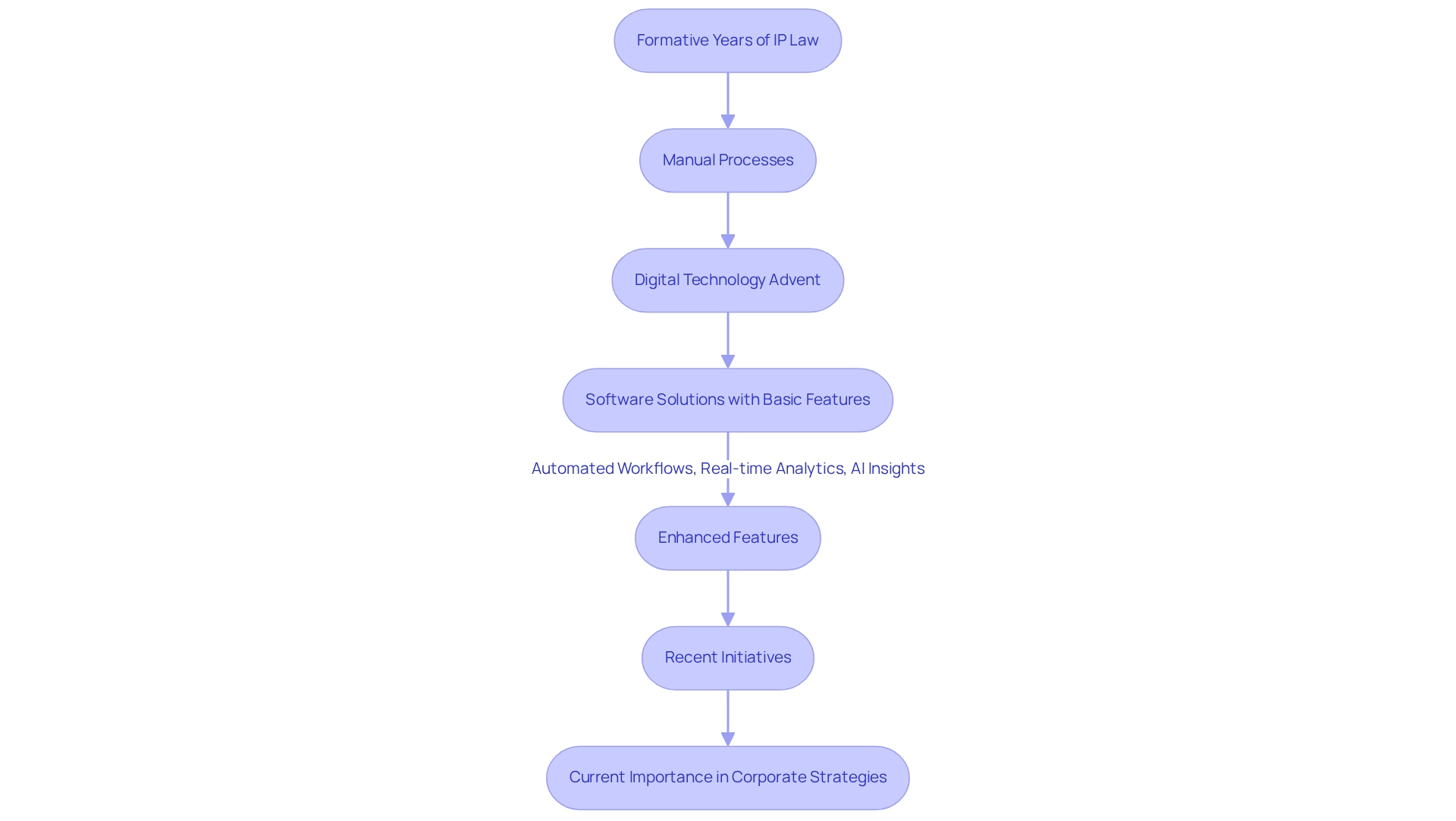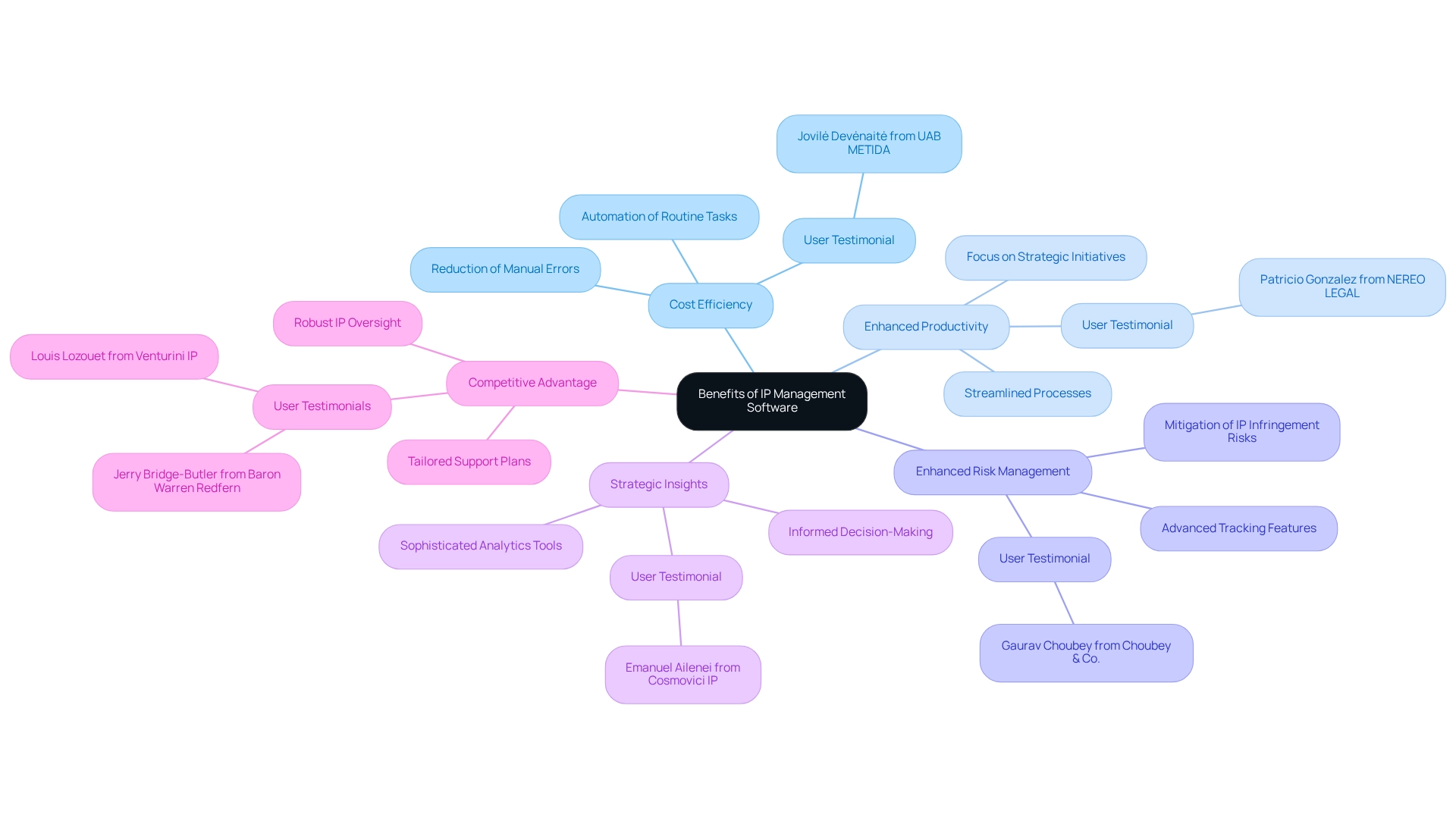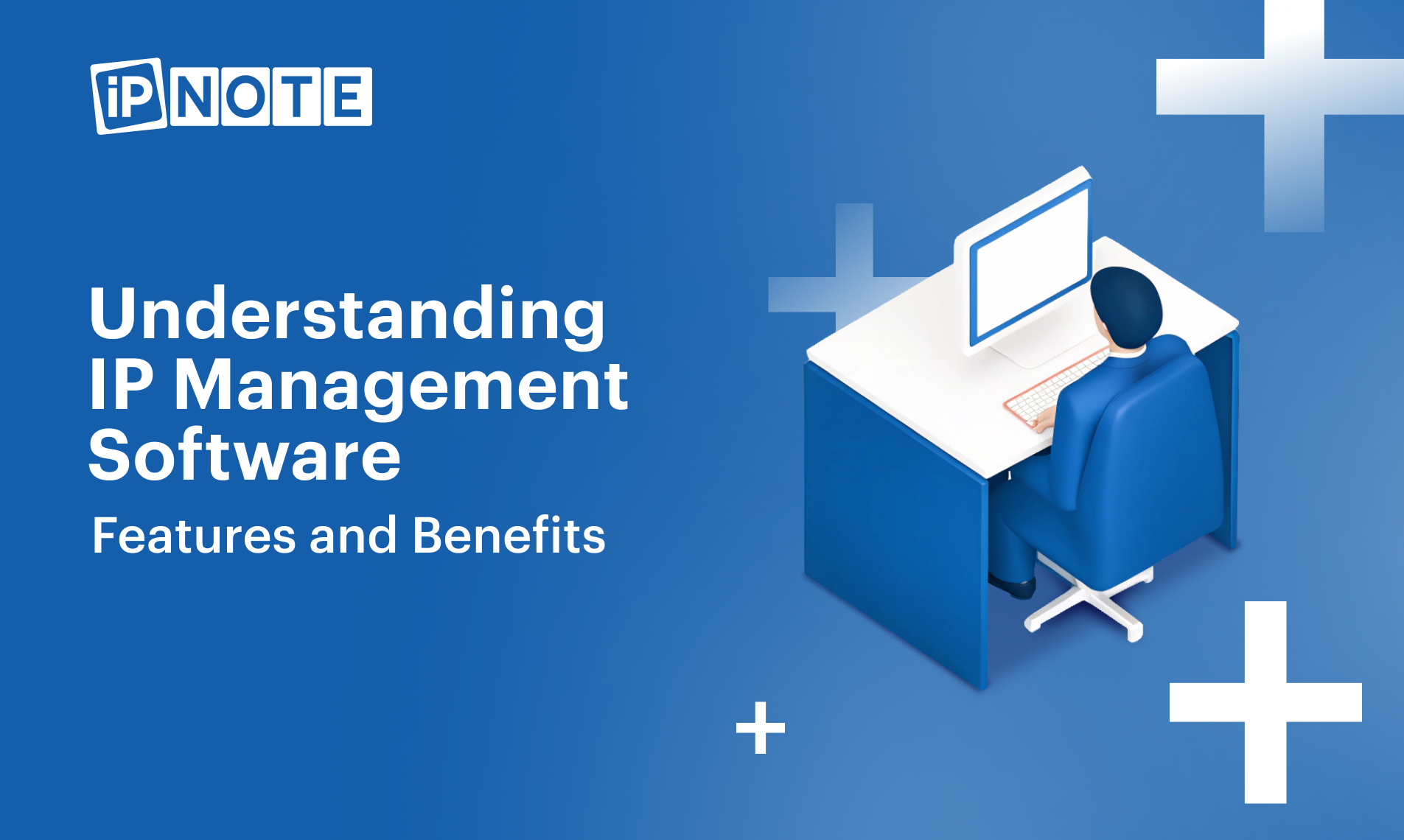Overview
IP management software is indispensable for organizations aiming to efficiently manage their intellectual property assets. By enhancing operational efficiency, reducing costs, and mitigating risks associated with mismanagement, these tools play a crucial role in any strategic framework. Notably, the software offers features such as automated workflows, compliance monitoring, and advanced analytics. Collectively, these functionalities streamline processes and empower organizations to make informed strategic decisions. As a result, they maintain a competitive advantage in an increasingly digital landscape.
Consider the implications of effective IP management: it not only safeguards valuable assets but also fosters innovation and growth. Organizations that leverage these tools are better positioned to navigate the complexities of intellectual property, ensuring they remain ahead of the curve. In today’s fast-paced environment, adopting such technologies is not just beneficial; it is essential for long-term success.
In conclusion, investing in IP management software is a strategic move that can yield significant returns. Organizations are encouraged to evaluate their current IP management practices and consider integrating these advanced tools to enhance their operational capabilities.
Introduction
In the competitive realm of business, intellectual property (IP) serves as a vital asset, yet its management often proves complex and resource-intensive. Enter IP management software—a transformative tool designed to streamline the oversight of patents, trademarks, copyrights, and trade secrets. As organizations increasingly recognize the value of their intellectual assets, the need for effective management solutions becomes paramount. This article delves into the significance of IP management software, exploring its evolution, key features, and the myriad benefits it offers businesses striving for operational efficiency and strategic advantage in today’s fast-paced digital landscape. With advancements like iPNOTE leading the charge, the future of IP management is not only promising but essential for fostering innovation and ensuring compliance in an ever-evolving market.
Define IP Management Software and Its Importance
IP administration tools encompass specialized resources that assist organizations in overseeing their intellectual property (IP) assets, such as patents, trademarks, copyrights, and trade secrets. These platforms facilitate the efficient tracking, oversight, and protection of IP rights, ensuring compliance with legal obligations and deadlines. The significance of IP management software is underscored by its capacity to enhance operational efficiency, reduce costs, and mitigate risks associated with IP mismanagement. As companies increasingly acknowledge the intrinsic value of their intellectual property, effective oversight becomes essential for sustaining competitive advantage and fostering innovation.
In 2025, the importance of IP management software is further magnified by the ongoing digital transformation within the sector. For instance, the UAE’s initiative to digitize its IP filing system aims to decrease processing times by 40%, exemplifying a broader trend toward efficiency in IP oversight. This initiative not only underscores the urgency for businesses to embrace digital solutions but also acts as a catalyst for similar transformations worldwide. Industry experts assert that the rising adoption of digital solutions, bolstered by robust regulatory frameworks, is poised to drive sustained growth in this domain. As noted by Straits Research, “The increasing use of digital solutions in IP oversight, along with robust regulatory backing, is anticipated to drive ongoing expansion in the area.”
The benefits of utilizing IP software, particularly the comprehensive AI-driven platform, are manifold. Businesses can streamline their processes, enhance collaboration among teams, and ensure timely compliance with IP regulations. This platform offers sophisticated task and provider oversight features, including fixed-term agreements and full transparency, automating routine activities and significantly lowering operational costs. Real-world examples illustrate this impact: organizations employing advanced IP solutions have reported notable improvements in operational efficiency and asset protection. For instance, a recent case study highlighted that a leading technology company using a specific tool achieved a 30% reduction in time spent on compliance tasks and a marked enhancement in the accuracy of their IP filings. As the landscape evolves, expert opinions emphasize that effective IP oversight is not merely a necessity but a strategic advantage that propels enterprises forward in a competitive marketplace.
Furthermore, the current market dynamics are characterized by strategic acquisitions aimed at bolstering product offerings and expanding customer bases. This trend emphasizes the critical role of IP management software in optimizing the value of intellectual property assets, ultimately contributing to the overall success and sustainability of companies in today’s dynamic environment.
Testimonials from satisfied clients further reinforce this perspective, showcasing iPNOTE’s efficacy in addressing diverse IP needs and nurturing robust client-provider relationships.
Explore the Evolution and Context of IP Management Software
The evolution of IP administration tools traces back to the formative years of intellectual property law, characterized by labor-intensive manual processes. Initially, managing IP necessitated extensive paperwork and meticulous tracking of deadlines—an approach that was not only time-consuming but also prone to errors.
The late 20th century heralded a pivotal shift with the advent of digital technology, paving the way for software solutions that offered foundational functionalities for tracking IP assets. As the demand for IP management software expanded, these tools underwent significant enhancements, integrating features such as:
- Automated workflows
- Real-time analytics
- AI-driven insights
This burgeoning market has spurred innovation and progress in IP solutions, underscoring the importance of these advancements. A notable example is the recent pilot initiative by CNIPA and IPONZ, launched in October 2024, aimed at streamlining patent examination procedures across nations. This initiative exemplifies the ongoing evolution and global collaboration in intellectual property, anticipated to accelerate patent approvals and enhance efficiency within the IP landscape.
Today, IP management software is integral to corporate strategies, enabling organizations to adeptly navigate the increasingly intricate IP environment with precision and effectiveness. The IT and Telecom sector, which commands the largest market share, is projected to achieve a compound annual growth rate (CAGR) of 18.82% throughout the forecast period, as reported by Straits Research. This statistic further emphasizes the rising significance of IP management software as a crucial digital tool in contemporary business practices. Additionally, recent advancements such as Anaqua’s developments in its Foreign Filing service further illustrate the dynamic nature of the IP oversight landscape.

Identify Key Features and Functionalities of IP Management Software
The key features of the IP management software are essential for enhancing the handling of intellectual property assets. These tools typically include:
- Automated Renewals: This functionality streamlines the renewal process for patents and trademarks, significantly reducing the risk of lapses in protection, which is vital for maintaining competitive advantage. As the demand for digital solutions in the Latin American market grows, automated renewals become increasingly important for organizations aiming to safeguard their IP assets.
- Document Management: iPNOTE offers a secure and organized system for storing all relevant IP documentation, ensuring easy access and retrieval, which enhances operational efficiency. The integrated intellectual property system is designed to manage documents effectively, including storage and retrieval processes.
- Collaboration Tools: These features enable smooth communication among team members and external stakeholders, promoting effective cooperation across departments engaged in IP oversight. For example, the case study named “Enhancing Collaboration and Communication” demonstrates how the IP software from the company offers a centralized platform for information sharing and activity coordination, resulting in enhanced teamwork.
- Analytics and Reporting: By providing insights into IP portfolio performance, these tools empower organizations to make informed strategic decisions, aligning IP management with broader business objectives. The analytics functionalities of the platform enable users to monitor performance metrics and enhance their IP strategies.
- Compliance Monitoring: This functionality ensures adherence to legal requirements and deadlines, mitigating the risk of penalties and enhancing overall compliance. The commitment to data privacy and security is reflected in its compliance monitoring features, which assist organizations in navigating the complexities of IP law.
In the context of iPNOTE, a “User” refers to individuals or organizations utilizing the software, while a “Client” is a company that defines tasks and enters agreements with consultants for IP-related services. The “Consultant” is a professional entity that provides expertise in intellectual property matters. The incorporation of these features not only improves the efficiency of IP oversight but also aids companies in safeguarding their innovations effectively. Companies utilizing automated renewals and document organization have reported significant enhancements in operational workflows, demonstrating the tangible benefits of adopting advanced IP oversight solutions. As the legal sector is a major driver of demand for IP oversight solutions in North America, comprehending these features is crucial for corporate IP managers. Discover how iPNOTE can change your innovation journey by trying it for free, highlighting the transformative capabilities of IP tools.
Examine the Benefits of IP Management Software for Business Success
Implementing IP control tools presents a multitude of advantages that significantly influence business success:
- Cost Efficiency: The automation of routine tasks and the reduction of manual errors lead to substantial operational cost savings in IP oversight. Companies that utilize IP management software have reported considerable reductions in administrative expenses, particularly given the increasing volume of IP management. Users like Jovilė Devėnaitė from UAB METIDA assert that this service ranks among the best for IP services globally, showcasing its effectiveness in managing costs.
- Enhanced Productivity: By streamlining processes, teams can shift their focus from administrative tasks to strategic initiatives, thereby fostering innovation and creativity within the organization. Patricio Gonzalez from NEREO LEGAL notes that the platform offers a clear, streamlined process for various IP needs, which not only boosts productivity but also enables firms to concentrate on their core competencies.
- Enhanced Risk Management: Advanced tracking and compliance features empower organizations to mitigate risks associated with IP infringement and mismanagement, thereby protecting their assets. Gaurav Choubey from Choubey & Co. highlights the platform’s responsiveness in addressing challenges, which improves risk oversight and builds user trust in the system.
- Strategic Insights: Utilizing sophisticated analytics tools allows organizations to gain valuable insights into their IP portfolio performance, facilitating informed decision-making and strategic planning. Emanuel Ailenei from Cosmovici IP appreciates the platform’s ability to enable clients to select their lawyers, enhancing clarity and strategic coherence in IP oversight.
- Competitive Advantage: Robust IP oversight not only safeguards innovations but also assists companies in maintaining their market position and seizing new opportunities. The Prime Ultra plan, as described by users such as Louis Lozouet from Venturini IP, provides tailored support, including a personalized marketing strategy and reduced commission rates, offering a significant competitive edge in the marketplace. This plan ensures that clients can connect with potential customers efficiently, as noted by Jerry Bridge-Butler from Baron Warren Redfern, who commends the platform’s simplicity and effectiveness in client engagement.
In conclusion, adopting IP management software represents a strategic investment that drives growth and enhances organizational resilience, positioning businesses for success in an increasingly digital landscape.

Conclusion
The significance of IP management software in today’s competitive business landscape is paramount.
By streamlining the oversight of intellectual property assets—such as patents, trademarks, copyrights, and trade secrets—these tools significantly enhance operational efficiency, reduce costs, and mitigate risks associated with mismanagement. Advancements like iPNOTE are leading the way, equipping organizations to navigate the complexities of IP management, ensuring compliance, and fostering innovation.
As the market continues to evolve, the integration of features such as automated renewals, document management, and analytics empowers businesses to make informed decisions. This strategic alignment of IP management with broader objectives is essential. The evolution from manual processes to sophisticated digital solutions has transformed how companies protect and leverage their intellectual assets. Effective IP management has become not just a necessity but a strategic advantage.
Ultimately, adopting IP management software represents a forward-thinking investment that positions businesses for success in an ever-changing digital landscape. With the potential to drive growth, enhance productivity, and secure a competitive edge, organizations that embrace these tools are better prepared to safeguard their innovations and thrive in the marketplace. The future of IP management is bright, and the time to invest in these transformative solutions is now.
Unlock Your Competitive Edge with Smart IP Management! Start with iPNOTE today and transform how you protect and leverage your intellectual assets.
Frequently Asked Questions
What are IP administration tools?
IP administration tools are specialized resources that help organizations manage their intellectual property (IP) assets, including patents, trademarks, copyrights, and trade secrets. They facilitate tracking, oversight, and protection of IP rights while ensuring compliance with legal obligations and deadlines.
Why is IP management software important?
IP management software enhances operational efficiency, reduces costs, and mitigates risks associated with IP mismanagement. It is essential for sustaining competitive advantage and fostering innovation as companies recognize the value of their intellectual property.
How is digital transformation affecting IP management in 2025?
The ongoing digital transformation is increasing the importance of IP management software. For example, the UAE’s initiative to digitize its IP filing system aims to reduce processing times by 40%, highlighting a trend towards efficiency in IP oversight and encouraging businesses to adopt digital solutions.
What benefits does AI-driven IP software provide?
AI-driven IP software streamlines processes, enhances team collaboration, and ensures timely compliance with IP regulations. It automates routine activities, lowers operational costs, and offers features for task and provider oversight, including fixed-term agreements and transparency.
Can you provide an example of the impact of advanced IP solutions?
A leading technology company using advanced IP solutions reported a 30% reduction in time spent on compliance tasks and improved accuracy in their IP filings, demonstrating the significant impact of effective IP management tools.
What current market dynamics are influencing the use of IP management software?
Current market dynamics include strategic acquisitions aimed at enhancing product offerings and expanding customer bases, emphasizing the critical role of IP management software in optimizing the value of intellectual property assets for company success and sustainability.
How do client testimonials reflect the effectiveness of IP management software?
Client testimonials, such as those for iPNOTE, highlight the software’s efficacy in addressing diverse IP needs and fostering strong client-provider relationships, reinforcing its value in effective IP oversight.






